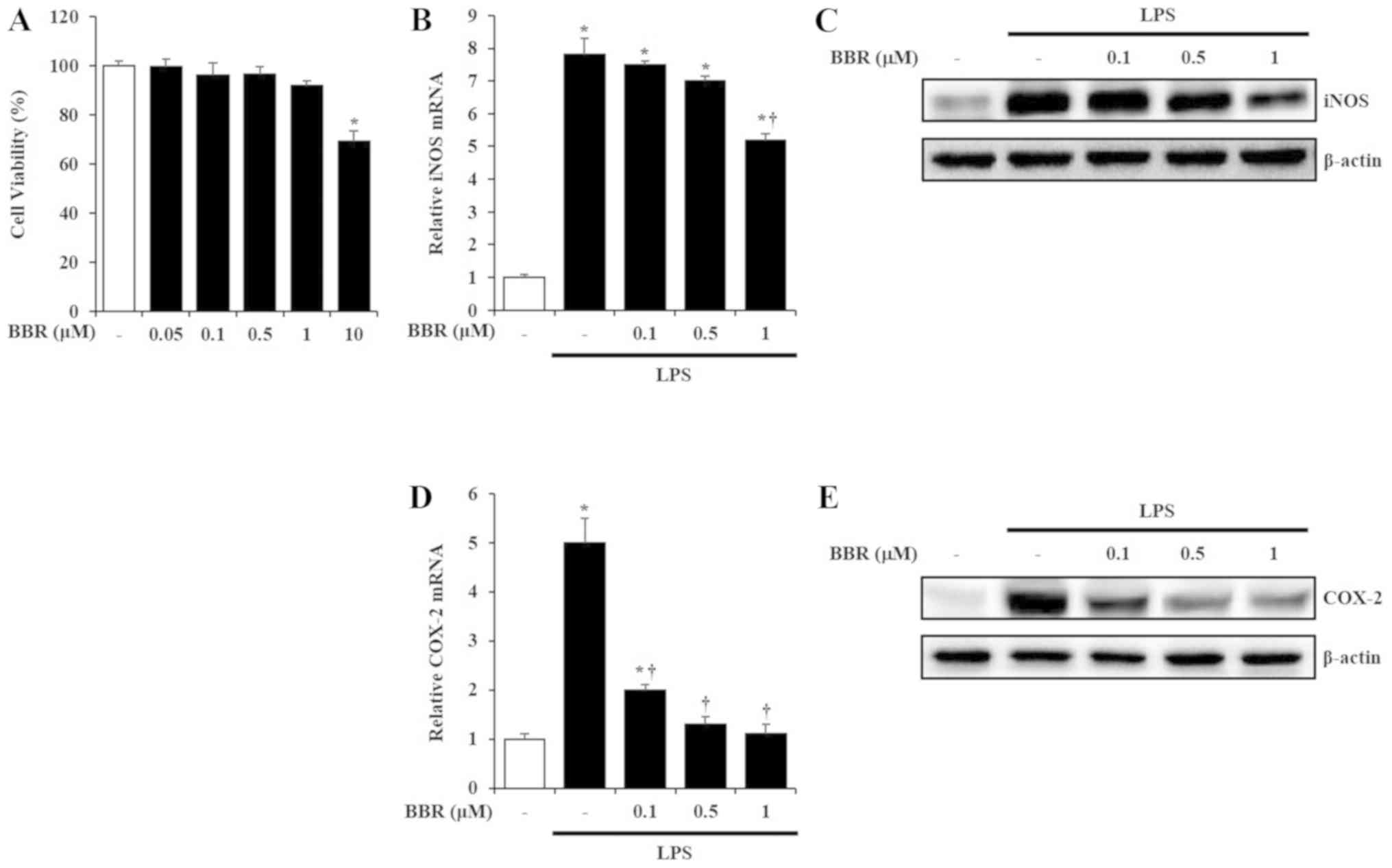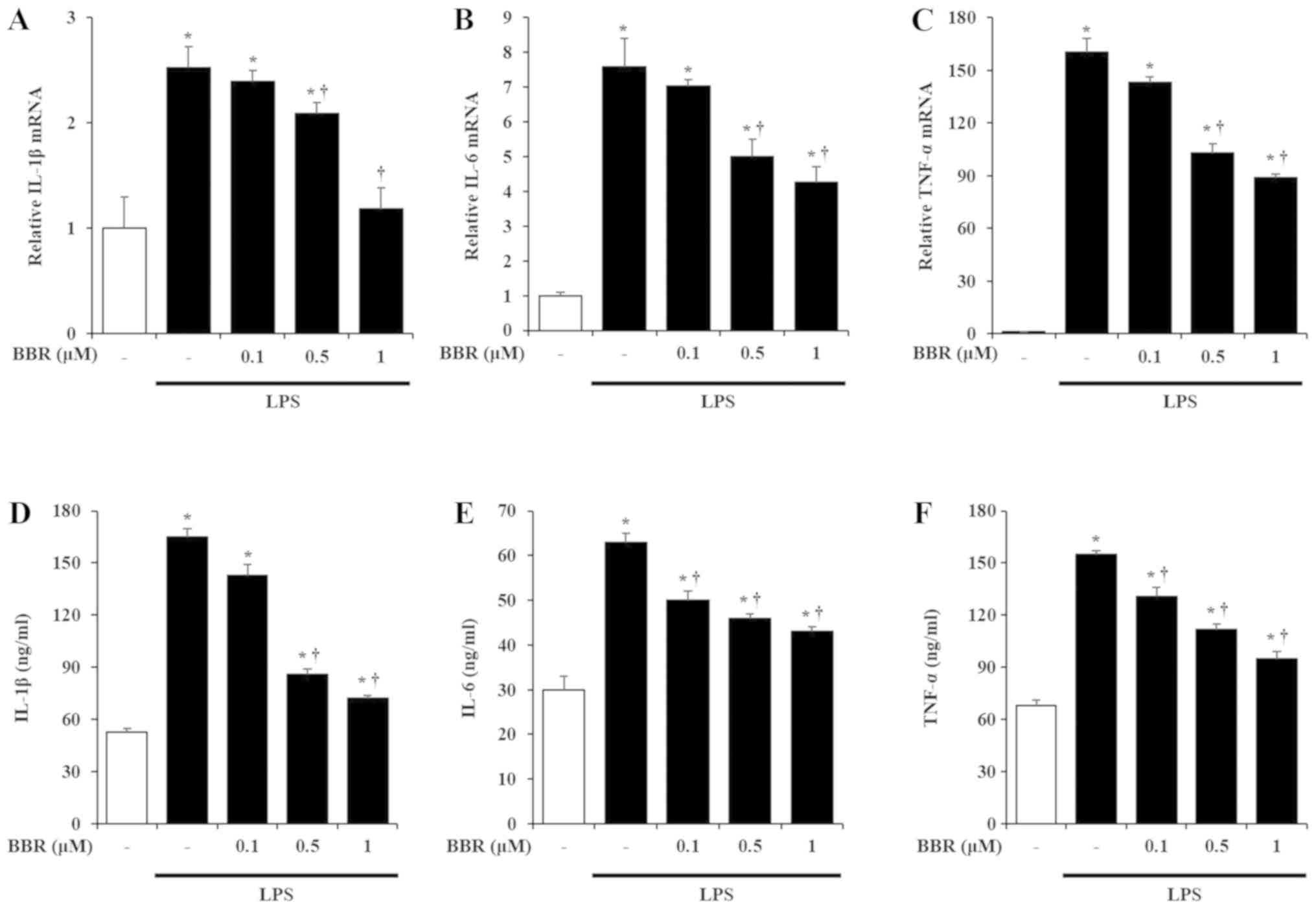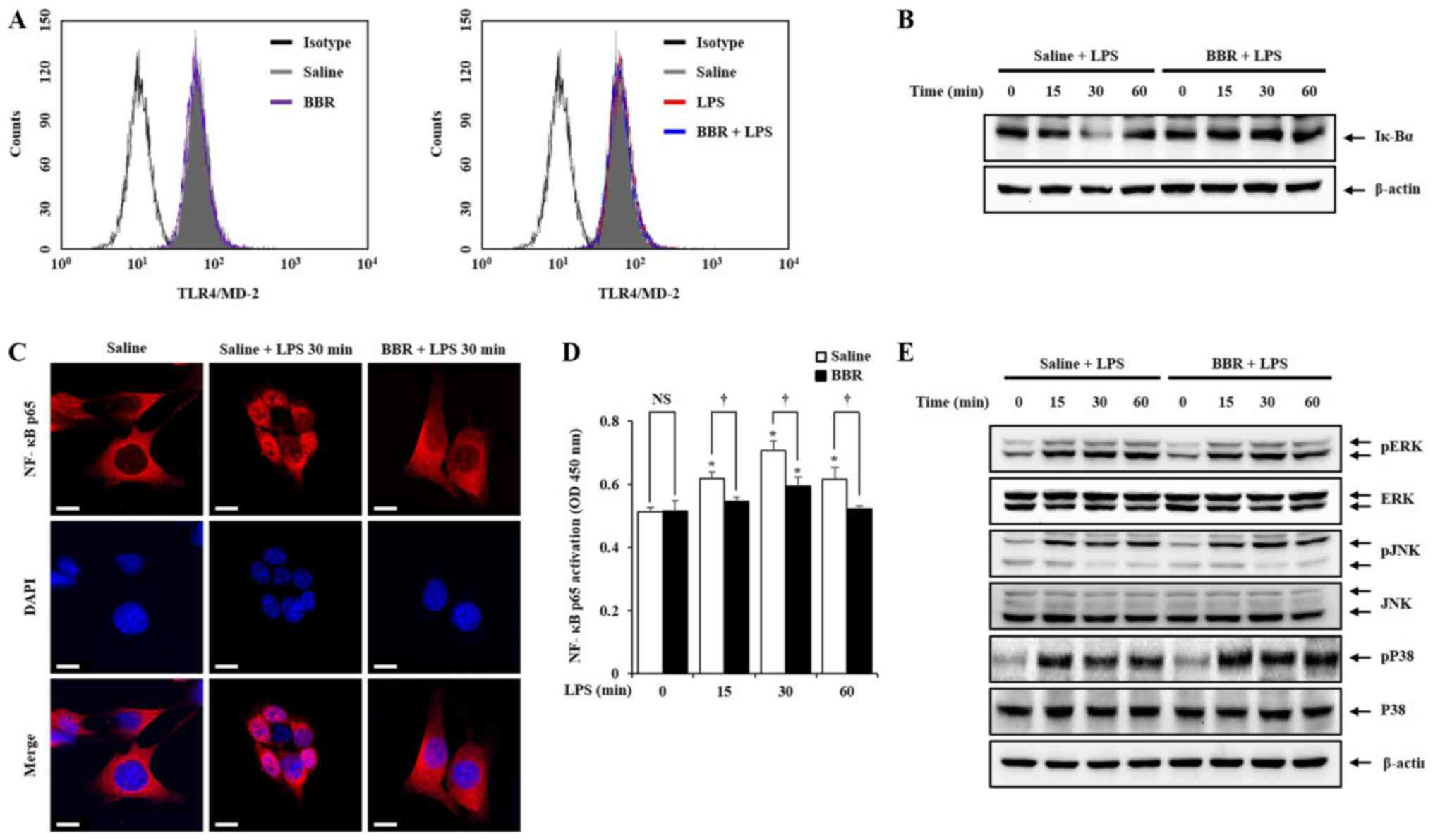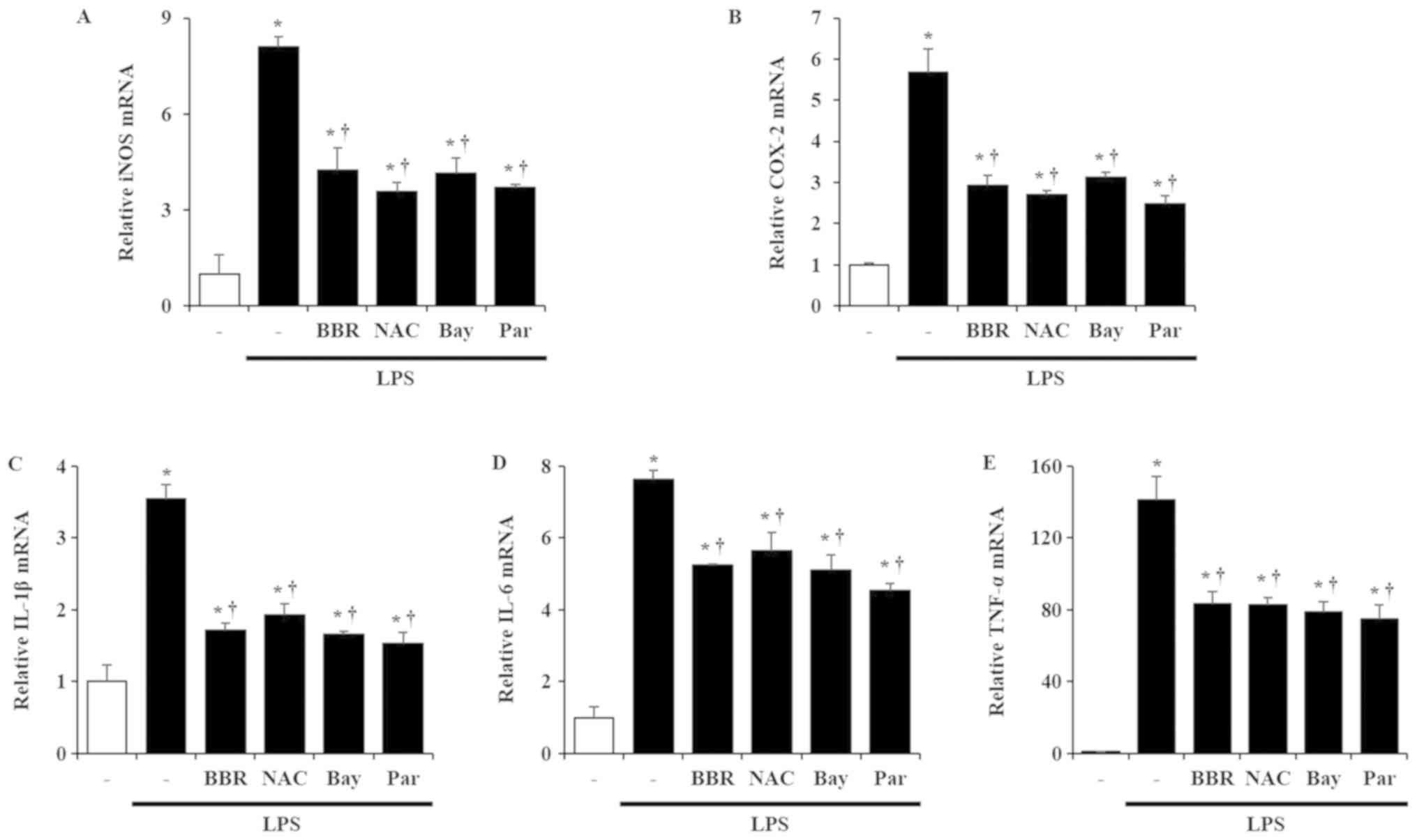|
1
|
Tchapyjnikov D, Li Y, Pisitkun T, Hoffert
JD, Yu MJ and Knepper MA: Proteomic profiling of nuclei from native
renal inner medullary collecting duct cells using LC-MS/MS. Physiol
Genomics. 40:167–183. 2010. View Article : Google Scholar : PubMed/NCBI
|
|
2
|
Kim DG, Bae GS, Jo IJ, Choi SB, Kim MJ,
Jeong JH, Kang DG, Lee HS, Song HJ and Park SJ: Guggulsterone
attenuated lipopolysaccharide-induced inflammatory responses in
mouse inner medullary collecting Duct-3 cells. Inflammation.
39:87–95. 2016. View Article : Google Scholar : PubMed/NCBI
|
|
3
|
Welch AK, Jeanette Lynch I, Gumz ML, Cain
BD and Wingo CS: Aldosterone alters the chromatin structure of the
murine endothelin-1 gene. Life Sci. 159:121–126. 2016. View Article : Google Scholar : PubMed/NCBI
|
|
4
|
Mohaupt MG, Schwöbel J, Elzie JL, Kannan
GS and Kone BC: Cytokines activate inducible nitric oxide synthase
gene transcription in inner medullary collecting duct cells. Am J
Physiol. 268:F770–F777. 1995.PubMed/NCBI
|
|
5
|
Chassin C, Vimont S, Cluzeaud F, Bens M,
Goujon JM, Fernandez B, Hertig A, Rondeau E, Arlet G, Hornef MW and
Vandewalle A: TLR4 facilitates translocation of bacteria across
renal collecting duct cells. J Am Soc Nephrol. 19:2364–2374. 2008.
View Article : Google Scholar : PubMed/NCBI
|
|
6
|
Chassin C, Goujon JM, Darche S, du Merle
L, Bens M, Cluzeaud F, Werts C, Ogier-Denis E, Le Bouguénec C,
Buzoni-Gatel D and Vandewalle A: Renal collecting duct epithelial
cells react to pyelonephritis-associated escherichia coli by
activating distinct TLR4-dependent and -independent inflammatory
pathways. J Immunol. 177:4773–4784. 2006. View Article : Google Scholar : PubMed/NCBI
|
|
7
|
Choi JY, Nam SA, Jin DC, Kim J and Cha JH:
Expression and cellular localization of inducible nitric oxide
synthase in lipopolysaccharide-treated rat kidneys. J Histochem
Cytochem. 60:301–315. 2012. View Article : Google Scholar : PubMed/NCBI
|
|
8
|
Küper C, Beck FX and Neuhofer W: Toll-like
receptor 4 activates NF-κB and MAP kinase pathways to regulate
expression of proinflammatory COX-2 in renal medullary collecting
duct cells. Am J Physiol Renal Physiol. 302:F38–F46. 2012.
View Article : Google Scholar : PubMed/NCBI
|
|
9
|
Sun SF, Zhao TT, Zhang HJ, Huang XR, Zhang
WK, Zhang L, Yan MH, Dong X, Wang H, Wen YM, et al: Renoprotective
effect of berberine on type 2 diabetic nephropathy in rats. Clin
Exp Pharmacol Physiol. 42:662–670. 2015. View Article : Google Scholar : PubMed/NCBI
|
|
10
|
Linn YC, Lu J, Lim LC, Sun H, Sun J, Zhou
Y and Ng HS: Berberine-induced haemolysis revisited: Safety of
Rhizoma coptidis and cortex phellodendri in chronic haematological
diseases. Phytother Res. 26:682–686. 2012. View Article : Google Scholar : PubMed/NCBI
|
|
11
|
Dong Y, Chen YT, Yang YX, Zhou XJ, Dai SJ,
Tong JF, Shou D and Li C: Metabolomics study of type 2 diabetes
mellitus and the antidiabetic effect of berberine in zucker
diabetic fatty rats using Uplc-ESI-Hdms. Phytother Res. 30:823–828.
2016. View
Article : Google Scholar : PubMed/NCBI
|
|
12
|
Wang J, Peng Y, Liu Y, Yang J, Ding N and
Tan W: Berberine, a natural compound, suppresses Hedgehog signaling
pathway activity and cancer growth. BMC Cancer. 15:5952015.
View Article : Google Scholar : PubMed/NCBI
|
|
13
|
Pietra D, Borghini A and Bianucci AM: In
vitro studies of antifibrotic and cytoprotective effects elicited
by proto-berberine alkaloids in human dermal fibroblasts. Pharmacol
Rep. 67:1081–1089. 2015. View Article : Google Scholar : PubMed/NCBI
|
|
14
|
Peng L, Kang S, Yin Z, Jia R, Song X, Li
L, Li Z, Zou Y, Liang X, Li L, et al: Antibacterial activity and
mechanism of berberine against Streptococcus agalactiae. Int J Clin
Exp Pathol. 8:5217–5223. 2015.PubMed/NCBI
|
|
15
|
Kwon OJ, Kim MY, Shin SH, Lee AR, Lee JY,
Seo BI, Shin MR, Choi HG, Kim JA, Min BS, et al: Antioxidant and
anti-inflammatory effects of Rhei rhizoma and coptidis rhizoma
mixture on reflux esophagitis in rats. Evid Based Complement Altern
Med. 2016:20521802016. View Article : Google Scholar
|
|
16
|
Wang B, Xu X, He X, Wang Z and Yang M:
Berberine improved aldo-induced podocyte injury via inhibiting
oxidative stress and endoplasmic reticulum stress pathways both in
vivo and in vitro. Cell Physiol Biochem. 39:217–228. 2016.
View Article : Google Scholar : PubMed/NCBI
|
|
17
|
Adil M, Kandhare AD, Dalvi G, Ghosh P,
Venkata S, Raygude KS and Bodhankar SL: Ameliorative effect of
berberine against gentamicin-induced nephrotoxicity in rats via
attenuation of oxidative stress, inflammation, apoptosis and
mitochondrial dysfunction. Ren Fail. 38:996–1006. 2016. View Article : Google Scholar : PubMed/NCBI
|
|
18
|
Chen X, Zhang Y, Zhu Z, Liu H, Guo H,
Xiong C, Xie K, Zhang X and Su S: Protective effect of berberine on
doxorubicin-induced acute hepatorenal toxicity in rats. Mol Med
Rep. 13:3953–3960. 2016. View Article : Google Scholar : PubMed/NCBI
|
|
19
|
Jiang Q, Liu P, Wu X, Liu W, Shen X, Lan
T, Xu S, Peng J, Xie X and Huang H: Berberine attenuates
lipopolysaccharide-induced extracelluar matrix accumulation and
inflammation in rat mesangial cells: Involvement of NF-κB signaling
pathway. Mol Cell Endocrinol. 331:34–40. 2011. View Article : Google Scholar : PubMed/NCBI
|
|
20
|
Yokozawa T, Ishida A, Kashiwada Y, Cho EJ,
Kim HY and Ikeshiro Y: Coptidis Rhizoma: Protective effects against
peroxynitrite-induced oxidative damage and elucidation of its
active components. J Pharm Pharmacol. 56:547–556. 2004. View Article : Google Scholar : PubMed/NCBI
|
|
21
|
Livak KJ and Schmittgen TD: Analysis of
relative gene expression data using real-time quantitative PCR and
the 2(-Delta Delta C(T)) method. Methods. 25:402–408. 2001.
View Article : Google Scholar : PubMed/NCBI
|
|
22
|
Pålsson-McDermott EM and O'Neill LA:
Signal transduction by the lipopolysaccharide receptor, Toll-like
receptor-4. Immunology. 113:153–162. 2004. View Article : Google Scholar : PubMed/NCBI
|
|
23
|
Zhu L, Gu P and Shen H: Protective effects
of berberine hydrochloride on DSS-induced ulcerative colitis in
rats. Int Immunopharmacol. 68:242–251. 2019. View Article : Google Scholar : PubMed/NCBI
|
|
24
|
Rezaee R, Monemi A, SadeghiBonjar MA and
Hashemzaei M: Berberine alleviates paclitaxel-induced neuropathy. J
Pharmacopuncture. 22:90–94. 2019.PubMed/NCBI
|
|
25
|
Domitrović R, Cvijanović O, Pernjak-Pugel
E, Skoda M, Mikelić L and Crnčević-Orlić Ž: Berberine exerts
nephroprotective effect against cisplatin-induced kidney damage
through inhibition of oxidative/nitrosative stress, inflammation,
autophagy and apoptosis. Food Chem Toxicol. 62:397–406. 2013.
View Article : Google Scholar : PubMed/NCBI
|
|
26
|
Zhu L, Han J, Yuan R, Xue L and Pang W:
Berberine ameliorates diabetic nephropathy by inhibiting TLR4/NF-κB
pathway. Biol Res. 51:92018. View Article : Google Scholar : PubMed/NCBI
|
|
27
|
Li ZY, Liu B, Zhuang XJ, Shen YD, Tian HR,
Ji Y, Li LX and Liu F: Effects of berberine on the serum cystatin C
levels and urine albumin/creatine ratio in patients with type 2
diabetes mellitus. Zhonghua Yi Xue Za Zhi. 98:3756–3761. 2018.(In
Chinese). PubMed/NCBI
|
|
28
|
Hu Y, Ehli EA, Kittelsrud J, Ronan PJ,
Munger K, Downey T, Bohlen K, Callahan L, Munson V, Jahnke M, et
al: Lipid-lowering effect of berberine in human subjects and rats.
Phytomedicine. 19:861–867. 2012. View Article : Google Scholar : PubMed/NCBI
|
|
29
|
Yin J, Xing H and Ye J: Efficacy of
berberine in patients with type 2 diabetes mellitus. Metabolism.
57:712–717. 2008. View Article : Google Scholar : PubMed/NCBI
|
|
30
|
Flores-Mireles AL, Walker JN, Caparon M
and Hultgren SJ: Urinary tract infections: Epidemiology, mechanisms
of infection and treatment options. Nat Rev Microbiol. 13:269–284.
2015. View Article : Google Scholar : PubMed/NCBI
|
|
31
|
Stone SC, Mallon WK, Childs JM and
Docherty SD: Emphysematous pyelonephritis: Clues to rapid diagnosis
in the Emergency Department. J Emerg Med. 28:315–319. 2005.
View Article : Google Scholar : PubMed/NCBI
|
|
32
|
Kim JE, Jung HJ, Lee YJ and Kwon TH:
Vasopressin-regulated miRNAs and AQP2-targeting miRNAs in kidney
collecting duct cells. Am J Physiol Renal Physiol. 308:F749–F764.
2015. View Article : Google Scholar : PubMed/NCBI
|
|
33
|
Gao M, Cao R, Du S, Jia X, Zheng S, Huang
S, Han Q, Liu J, Zhang X, Miao Y, et al: Disruption of
prostaglandin E2 receptor EP4 impairs urinary concentration via
decreasing aquaporin 2 in renal collecting ducts. Proc Natl Acad
Sci USA. 112:8397–8402. 2015. View Article : Google Scholar : PubMed/NCBI
|
|
34
|
Kishore BK, Nelson RD, Miller RL, Carlson
NG and Kohan DE: P2Y(2) receptors and water transport in the
kidney. Purinergic Signal. 5:491–499. 2009. View Article : Google Scholar : PubMed/NCBI
|
|
35
|
Li YX, Huang Y, Liu S, Mao Y, Yuan CY,
Yang X and Yao LJ: Glycogen synthase kinase-3 modulates
hyperosmotic-induced urea transporter A1 relocation in the inner
medullary collecting duct cells. Nephron. 133:71–79. 2016.
View Article : Google Scholar : PubMed/NCBI
|
|
36
|
Hyndman KA, Dugas C, Arguello AM,
Goodchild TT, Buckley KM, Burch M, Yanagisawa M and Pollock JS:
High salt induces autocrine actions of ET-1 on inner medullary
collecting duct NO production via upregulated ETB receptor
expression. Am J Physiol Regul Integr Comp Physiol. 311:R263–R271.
2016. View Article : Google Scholar : PubMed/NCBI
|
|
37
|
Pandit MM, Gao Y, van Hoek A and Kohan DE:
Osmolar regulation of endothelin-1 production by the inner
medullary collecting duct. Life Sci. 159:135–139. 2016. View Article : Google Scholar : PubMed/NCBI
|
|
38
|
Fuson AL, Komlosi P, Unlap TM, Bell PD and
Peti-Peterdi J: Immunolocalization of a microsomal prostaglandin E
synthase in rabbit kidney. Am J Physiol Renal Physiol.
285:F558–F564. 2003. View Article : Google Scholar : PubMed/NCBI
|
|
39
|
Gueutin V, Vallet M, Jayat M, Peti-Peterdi
J, Cornière N, Leviel F, Sohet F, Wagner CA, Eladari D and Chambrey
R: Renal β-intercalated cells maintain body fluid and electrolyte
balance. J Clin Invest. 123:4219–4231. 2013. View Article : Google Scholar : PubMed/NCBI
|
|
40
|
Huo TL, Grenader A, Blandina P and Healy
DP: Prostaglandin E2 production in rat IMCD cells. II. Possible
role for locally formed dopamine. Am J Physiol. 261:F655–F662.
1991.PubMed/NCBI
|
|
41
|
Chen M, Cai H, Klein JD, Laur O and Chen
G: Dexamethasone increases aquaporin-2 protein expression in ex
vivo inner medullary collecting duct suspensions. Front Physiol.
6:3102015. View Article : Google Scholar : PubMed/NCBI
|
|
42
|
Ranieri M, Tamma G, Di Mise A, Russo A,
Centrone M, Svelto M, Calamita G and Valenti G: Negative feedback
from CaSR signaling to aquaporin-2 sensitizes vasopressin to
extracellular Ca2. J Cell Sci. 128:2350–2360. 2015. View Article : Google Scholar : PubMed/NCBI
|
|
43
|
Zheng P, Lin Y, Wang F, Luo R, Zhang T, Hu
S, Feng P, Liang X, Li C and Wang W: 4-PBA improves lithium-induced
nephrogenic diabetes insipidus by attenuating ER stress. Am J
Physiol Renal Physiol. 311:F763–F776. 2016. View Article : Google Scholar : PubMed/NCBI
|
|
44
|
Hyndman KA, Boesen EI, Elmarakby AA,
Brands MW, Huang P, Kohan DE, Pollock DM and Pollock JS: Renal
collecting duct NOS1 maintains fluid-electrolyte homeostasis and
blood pressure. Hypertension. 62:91–98. 2013. View Article : Google Scholar : PubMed/NCBI
|
|
45
|
Anders HJ and Muruve DA: The inflammasomes
in kidney disease. J Am Soc Nephrol. 22:1007–1018. 2011. View Article : Google Scholar : PubMed/NCBI
|
|
46
|
Hijiya N, Miyake K, Akashi S, Matsuura K,
Higuchi Y and Yamamoto S: Possible involvement of toll-like
receptor 4 in endothelial cell activation of larger vessels in
response to lipopolysaccharide. Pathobiology. 70:18–25. 2002.
View Article : Google Scholar : PubMed/NCBI
|
|
47
|
Tsukumo DM, Carvalho-Filho MA, Carvalheira
JB, Prada PO, Hirabara SM, Schenka AA, Araújo EP, Vassalo J, Curi
R, Velloso LA and Saad MJ: Loss-of-function mutation in toll-like
receptor 4 prevents diet-induced obesity and insulin resistance.
Diabetes. 56:1986–1998. 2007. View Article : Google Scholar : PubMed/NCBI
|
|
48
|
Nicola JP, Vélez ML, Lucero AM, Fozzatti
L, Pellizas CG and Masini-Repiso AM: Functional toll-like receptor
4 conferring lipopolysaccharide responsiveness is expressed in
thyroid cells. Endocrinology. 150:500–5008. 2009. View Article : Google Scholar : PubMed/NCBI
|
|
49
|
Hirata T, Osuga Y, Hirota Y, Koga K,
Yoshino O, Harada M, Morimoto C, Yano T, Nishii O, Tsutsumi O and
Taketani Y: Evidence for the presence of toll-like receptor 4
system in the human endometrium. J Clin Endocrinol Metab.
90:548–556. 2005. View Article : Google Scholar : PubMed/NCBI
|
|
50
|
Wolf G, Bohlender J, Bondeva T, Roger T,
Thaiss F and Wenzel UO: Angiotensin II upregulates toll-like
receptor 4 on mesangial cells. J Am Soc Nephrol. 17:1585–1593.
2006. View Article : Google Scholar : PubMed/NCBI
|
|
51
|
Vitseva OI, Tanriverdi K, Tchkonia TT,
Kirkland JL, McDonnell ME, Apovian CM, Freedman J and Gokce N:
Inducible toll-like receptor and NF-kappaB regulatory pathway
expression in human adipose tissue. Obesity (Silver Spring).
16:932–937. 2008. View Article : Google Scholar : PubMed/NCBI
|
|
52
|
Hayden MS and Ghosh S: NF-κB, the first
quarter-century: Remarkable progress and outstanding questions.
Genes Dev. 26:203–234. 2012. View Article : Google Scholar : PubMed/NCBI
|
|
53
|
Vallabhapurapu S and Karin M: Regulation
and function of NF-kappaB transcription factors in the immune
system. Annu Rev Immunol. 27:693–733. 2009. View Article : Google Scholar : PubMed/NCBI
|
|
54
|
Karin M and Greten FR: NF-kappaB: Linking
inflammation and immunity to cancer development and progression.
Nat Rev Immunol. 5:749–759. 2005. View Article : Google Scholar : PubMed/NCBI
|
|
55
|
Li Q and Verma IM: NF-kappaB regulation in
the immune system. Nat Rev Immunol. 2:725–734. 2002. View Article : Google Scholar : PubMed/NCBI
|
|
56
|
Ghosh S, May MJ and Kopp EB: NF-kappa B
and Rel proteins: Evolutionarily conserved mediators of immune
responses. Annu Rev Immunol. 16:225–260. 1998. View Article : Google Scholar : PubMed/NCBI
|
|
57
|
Caamaño J and Hunter CA: NF-kappaB family
of transcription factors: Central regulators of innate and adaptive
immune functions. Clin Microbiol Rev. 15:414–429. 2002. View Article : Google Scholar : PubMed/NCBI
|
|
58
|
May MJ and Ghosh S: Signal transduction
through NF-kappa B. Immunol Today. 19:80–88. 1998. View Article : Google Scholar : PubMed/NCBI
|
|
59
|
Oka S, Kamata H, Kamata K, Yagisawa H and
Hirata H: N-acetylcysteine suppresses TNF-induced NF-kappaB
activation through inhibition of IkappaB kinases. FEBS Lett.
472:196–202. 2000. View Article : Google Scholar : PubMed/NCBI
|
|
60
|
Gupta SC, Sundaram C, Reuter S and
Aggarwal BB: Inhibiting NF-κB activation by small molecules as a
therapeutic strategy. Biochim Biophys Acta. 1799:775–787. 2010.
View Article : Google Scholar : PubMed/NCBI
|
|
61
|
Strickson S, Campbell DG, Emmerich CH,
Knebel A, Plater L, Ritorto MS, Shpiro N and Cohen P: The
anti-inflammatory drug BAY 11-7082 suppresses the MyD88-dependent
signalling network by targeting the ubiquitin system. Biochem J.
451:427–437. 2013. View Article : Google Scholar : PubMed/NCBI
|
|
62
|
Ghashghaeinia M, Toulany M, Saki M,
Bobbala D, Fehrenbacher B, Rupec R, Rodemann HP, Ghoreschi K,
Röcken M, Schaller M, et al: The NFĸB pathway inhibitors bay
11-7082 and parthenolide induce programmed cell death in anucleated
erythrocytes. Cell Physiol Biochem. 27:45–54. 2011. View Article : Google Scholar : PubMed/NCBI
|
|
63
|
Zhao C, Wang Y, Yuan X, Sun G, Shen B, Xu
F, Fan G, Jin M, Li X and Liu G: Berberine inhibits
lipopolysaccharide-induced expression of inflammatory cytokines by
suppressing TLR4-mediated NF-ĸB and MAPK signaling pathways in
rumen epithelial cells of Holstein calves. J Dairy Res. 86:171–176.
2019. View Article : Google Scholar : PubMed/NCBI
|
|
64
|
Zhang H, Shan Y, Wu Y, Xu C, Yu X, Zhao J,
Yan J and Shang W: Berberine suppresses LPS-induced inflammation
through modulating Sirt1/NF-κB signaling pathway in RAW264.7 cells.
Int Immunopharmacol. 52:93–100. 2017. View Article : Google Scholar : PubMed/NCBI
|
|
65
|
Gao MY, Chen L, Yang L, Yu X, Kou JP and
Yu BY: Berberine inhibits LPS-induced TF procoagulant activity and
expression through NF-κB/p65, Akt and MAPK pathway in THP-1 cells.
Pharmacol Rep. 66:480–484. 2014. View Article : Google Scholar : PubMed/NCBI
|
|
66
|
Wang X, Feng S, Ding N, He Y, Li C, Li M,
Ding X, Ding H, Li J, Wu J and Li Y: Anti-inflammatory effects of
berberine hydrochloride in an LPS-induced murine model of mastitis.
Evid Based Complement Alternat Med. 2018:51643142018.PubMed/NCBI
|
|
67
|
Lee IA, Hyun YJ and Kim DH: Berberine
ameliorates TNBS-induced colitis by inhibiting lipid peroxidation,
enterobacterial growth and NF-κB activation. Eur J Pharmacol.
648:162–170. 2010. View Article : Google Scholar : PubMed/NCBI
|


















